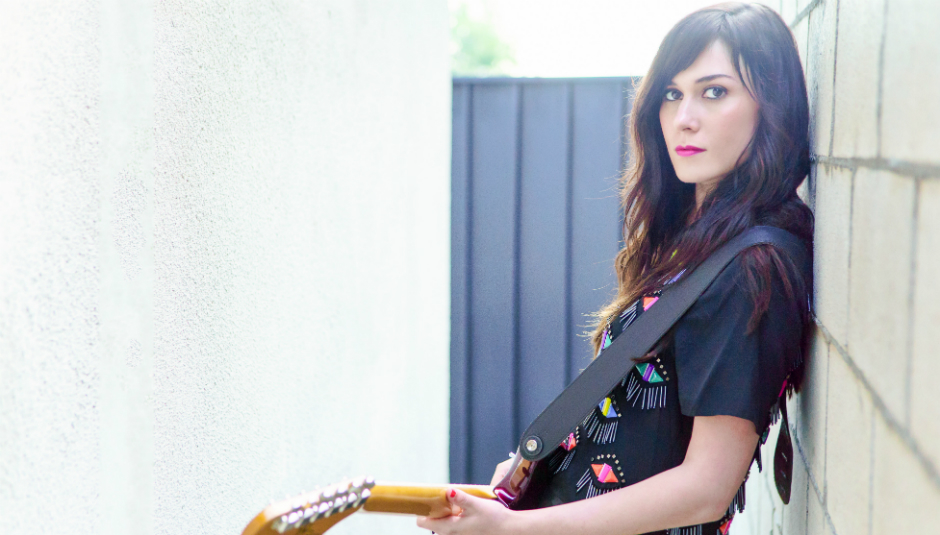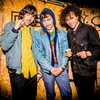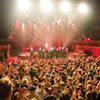One word that frequently pops up in Sarah Lipstate’s vocabulary is ‘brain’ or ‘brains’. This inventive composer and musician’s grey matter happens to be the seed for the gorgeous, astronomical guitar-scapes she conjures as Noveller. Her music stretches the instrument’s sonic compass to proportionately astronomical heights. That being said, there’s a level of accessibility in Noveller that debunks and transcends the ‘brainy’ prerequisite that gets – often unjustly – stapled onto her minimalist forebears, people like Steve Reich, Vangelis, Glenn Branca, and Philip Glass.
A lot of it has to do with Lipstate’s light-hearted and unflappable demeanor. At one point during our conversation back in February, she jokes about the earlier days of Noveller when she'd use domestic objects like bubble wrap and carrot peelers to interact with her instrument. “It became a bit impractical. One day I had to play a show in San Diego and I lost my carrot peeler, so I had to go find a new one. It was just the biggest pain in the ass! Someone found one for me, but it was plastic one. It had to be metal. At one point I was like: ‘What am I doing, this is just silly!’ People thought I was insane, they kept asking me: ‘Why doesn’t this carrot peeler work for you?’”
Safe to say Noveller’s carrot peeler days are a thing of the past. “It’s great to think about extended technique and different approaches to playing, though. That’s all very useful, but it’s a bit silly to get too attached to these objects. The carrot peeler in itself isn’t creating any magic. But the concept of pushing the instrument in different ways, that’s what I’m always trying to do. That’s exciting and innovative, so I’m trying to keep that perspective on things.”
Not to be too nosey, but how are you keeping balance in earning a living as a touring musician and doing commissioned work?
Sarah Lipstate: Well, it feels like a pretty decent balance. Luckily I'm at a point now where I released a couple of albums. I have a lot of my music out there, so fortunately, I frequently get licensing requests for short films or feature films. I will begin working on a feature length documentary, of which I just received a rough cut of. I'm going to be scoring that this year. I just got commissioned to write an eight-minute composition for cello with electronics. I’ve had a residency in New York to compose music for virtual reality. The walls of sound is different in a virtual environment, which broke my brain open to explore all these crazy new possibilities. You can hear music differently depending on where I was placed in a 3D space. It’s a lot more difficult to achieve that in a concrete space with speaker stacks.
And of course, I just released my new album A Pink Sunset For No One the 10th of February, so I'll be doing some live performances this year. To make a living doing only music, you have to have your hands in all these different areas. It's difficult to cobble together that living, but it tends to work out. I feel fortunate that people keep asking me to do different projects. So that's what's on the horizon for me at the moments. It's been a good start of the year.
Licensing your music is always an interesting choice, especially in your case. A lot of your music leaves so much to the listener's imagination. Were you guarded at first to lend your music out so to speak, because it gets correlated with something separate?
No, I haven't thought about it like that. I just think it's cool to have my music out there. I have licensed my music for all different types of films, so I don't think it gets associated with just one thing. Maybe if I did this huge movie that everyone will see, but most projects I work on are pretty independent. The music just reaches audiences in a different way, without tying it to any specific imagery.
You had a great touring run last year, especially with Iggy Pop. A great deal of people saw you play who might not have visited a Noveller show on their own. Are there any memorable reactions from audience members during that tour that stayed with you?
I met so many people on that tour, and whenever I could, I tried to do my own merch. So that was usually my opportunity to interact with audience members. It was interesting to hear what their reference points were. Some people who came had never heard Noveller music before. They didn't have any good reference points, usually bizarre ones like Led Zeppelin or Pink Floyd or something. But that was exciting for me, because an audience like that offers a diverse audience, especially age-wise.
You get people who have been fans of Iggy Pop since the 70s, and they would bring their kids along. So there were a lot of younger kids there too, who were very fun to meet. Young girls were excited that they've seen something a little different. Hopefully it made some kind of impact seeing women doing solo guitar projects. That was probably the most fun for me, meeting the young audience members. I don't know how different my life would've been if I hadn't seen Iggy Pop perform when I was ten years old, but I'm sure it made an impression on them. So that was really fun.
I loved the title of your previous album, Fantastic Planet, because it always reminds me of something Carl Sagan would say. Aesthetically, your music sounds like a modern kin to the soundtrack Vangelis wrote for Sagan's Cosmos series. A Pink Sunset For No One sounds a bit more cryptic, so I'm curious what that title means to you.
It is a bit cryptic, yeah. I talked about it in other interviews. I came up with the title at the end of 2015 I think. That's when I started recording the album. I was spending a lot of time in Louisiana, where I grew up. All my family still lives there. I had gone through a breakup, so I was kind of transitioning to being on my own again, and I was spending a lot of time walking my dog around my parents' neighborhood. And I saw these brilliant, gorgeous sunsets there, yet my first thought would be so cynical.
I'd think: 'Wow, this is such a beautiful sunset'. And doing so, I immediately wondered whether that truly matters if I'm not sharing it with anyone else. Your initial reaction when you walk around and see something funny, strange or beautiful, is to take your phone out and snap a picture of it and put it up online. To share it with people. I was really interested in trying to reprogram my brain, and allow myself to be in the present. To ask myself: What does it mean to stand here and take in the sunset? And to not have my partner here with me looking at it. Or not have a photo of it put on Instagram.
What does it mean these days to just appreciate something and to continue walking? It's hard! We're so trained now to document every second of our lives. I'm certainly guilty of that. It's usually based on gear, guitar stuff and pedals. I love sharing that stuff with people and creating a dialogue, but it's those little experiences that impact you. I think moving to Los Angeles has been good for me in that respect, because there is a lot more nature. I live in a neighborhood that up on the hills, there's a lot of beauty. I walk my dog there every day, and I just appreciate that every day. Of course, I take a picture now and then, but instead of posting it online, I just keep it for myself. But yeah, I feel it's interesting to maintain a certain perspective. That's where A Pink Sunset For No One sprung out of. It's interesting when people read interviews like this and read the story behind it, they're probably not going the get the same out of it. They can attach their own personal meaning to it.
If you did post a picture of that particular pink sunset on Instagram, and I saw that picture, I'd probably think it to be very quaint. But the feeling it instilled in you would get lost on me because I'm seeing it through a screen instead of being there with you. But then again, sharing an experience digitally can be really beautiful too. When people show me the whole library of their phone, it looks like a synthesis of colors reflecting their lives. For example, you see a lot of blue, which means they love visiting pools or exotic beaches. I do see the beauty in technology synthesizing, or visualizing, the human experience.
Yeah, it's like a scrapbook. I mean, people don't really make scrapbooks anymore. Instead, we carry these digital bricks that hold our memories. I definitely believe that reframes how we reflect on things and what we remember. For example, during the Iggy Pop tour I took so many photos's, primarily of Iggy performing and his interactions with the audience. I captured some really beautiful moments. Specifically – and now I'm kind of going off the tangent –, he has a really beautiful way of interacting with audiences. The stage diving, the crowd surfing, which are always raw and powerful.
But he would always make a point to go out into the audience during certain songs and just walk around. It was fun for me to go home from the tour and relive these moments. And notice things that maybe I missed when they actually happened. It reframes how you recall these events and your own impressions. Technology can either enhance them or distort them. I don't think anyone can deny our brains are changing because of the way we use technology now.
I read somewhere that your phone broke and you thought you had lost all the pictures.
Yeah, that happened after the tour. My phone had died! When I got a replacement there was this total gap encompassing like the entire tour in the photos. I was devastated by the idea of having lost all that, though luckily I was able to recover it! But that entire experience was negated because my documentation of it wasn't there. But you know, it still all happened! It just felt like waking up from this really elaborate dream, and the realization that it didn't actually happen. It's my brain synthesizing these events. If you don't have proof, it's like, 'did all of that really happen'? You feel this tremendous sense of loss.
It was a huge relief when I regained all of that data back. But that's pretty strange, right? I think people feel the same way about their old family photo albums. It's funny how attached we've become to these concrete representations of our memories. I think that's because our memories are so malleable and so unreliable. A photo is something tangible we can look at as confirmation that something occurred. It's interesting how we treasure those things.
I was in a similar situation recently, when the screen of my phone gave in. It was fixed later. I have a lot of photo's I cherish on there, and I never put them on a hard drive or printed them out for safekeeping. I should be devastated, but for some reason I immediately felt a strange peace about the prospect of losing that stuff. And I don't know why.
Right. I guess the main thing is the ability to share these moments with other people. Twenty years from now I'll probably meet new people, and it's cool to be able to pull out a photo, to show them what you did when you were still young. To be in the position to say: 'It was amazing, here let me show it to you.' But you can always tell stories to people, but there's always people who might be questioning the veracity. You could bury the truth, but if you show them the video, this crazy thing about playing the Royal Albert Hall in London with Iggy Pop definitely adds some credibility!
Your music uses distortion and noise in a textural sense, like debris around the melodies. Some people use these elements to express a mood, but in your music it creates this illusion of spatiality. Like the melody navigating itself within a certain space. Like a field recording, except you build it from scratch. It feels very visual, so I wonder if your background as a filmmaker attributes to that approach.
What you said about creating a sense of space through, that definitely resonates specifically on A Pink Sunset For No One. Especially on 'Lone Victory Tonight' I felt I was creating a specific place. I had this vague visual in my head whenever I hear that song. It's not a conscious goal of mine, but it happens so often, I think, again, it's linked to our brains being so accustomed to watching film or television, the idea that sound always accompanies or complements the visuals. When you play instrumental music, you don't hear anyone singing words to focus on, so your brain just naturally tends to create these landscapes. It's just the way our brains are trained really.
It's really fun for me, and it's something I hear a lot. Sometimes when people come up to me after shows, they will describe these very specific sceneries. It's crazy how elaborate they can be and how they differ from one another… or my own personal experience. I love how evocative music can be, especially textural soundscape music. It just feels so good you know. I've always, always been attracted to dissonant music; people like Glenn Branca resonated a lot to me when I was young. I find that tension very beautiful. Everything comes back to that ecstatic sense of beauty.
When you perform, do you feel like the voyager inside your own compositions in some way too?
I do. I try to get immersed in the sound when I’m performing live. Some situations are harder than others. There’s so much I have to keep track of; the pedal settings, the looping. There’s a lot of precision… I like using the word “choreography” because it really takes a lot of that; with my feet to operate the pedals, the stuff I’m playing on guitar when I’m building the layers. But if I’m sufficiently prepared, I can allow myself to get pulled into the sound. That’s when I have the most satisfying performances. When I can transcend all the details, everything kind of happens the way it’s supposed to. My hands are moving, my feet are moving and then I feel I don’t have to be in total command of that. I can float above that and just enjoy the music. I would say that’s what I’m striving for with every performance.
On A Pink Sunset For No One, you depart a bit from using guitar-scapes exclusively. There’s this wonderful transition in ‘Deep Shelter’ with the piano. It makes me wonder what aspects of composing music you aim to master, or at least be better at?
Well, there are two different things that pique my interest now; one is really funny. Because I’m not theoretically trained on the guitar, when I first started playing at age 17, I just came up with my own tunings. I’d simply tune the strings in a way that sounded cool to me and write music based on that. This year I decided to try out playing in standard guitar tuning, the way everyone else does it. And this is a total novelty to me! I just think that’s hilarious. Standard tuning is this new and exciting thing for me. But I’ve come full-circle around to it to the point that I don’t feel trapped by it. Those possibilities are quite exciting to me.
Another thing that I’ve been into, is going back full circle to playing the piano. I feel all that theoretical information is still stored in my brain somewhere because I’ve had pretty strict musical training drilled into me. Even though I’m not trained on the guitar, I’m appreciative of that training. It comes out in different, fairly abstract ways. It allowed me to feel more comfortable building my own relationship with the guitar. I spent years and years studying other instruments, so I felt I was finally allowed to approach guitar with a reckless abandon.
But I really want to access all that theory again. I just bought this MIDI-keyboard recently, which I can plug into my computer and access these libraries. I’ve been excited again about playing the piano. I think it would be cool to have all that stuff back at my fingertips. I’ve been doing a little bit of piano on ‘Deep Shelter’ of course, which was really satisfying. It complements the guitar so well on that song. It would be fun to have that more readily accessible in my brain again. So those are two interests for me to pursue this year, and see what happens!
A Pink Sunset For No One _is out now via Fire Records. For more information about the artist, please visit her official website
Photo credit: Priscilla C Scott






















